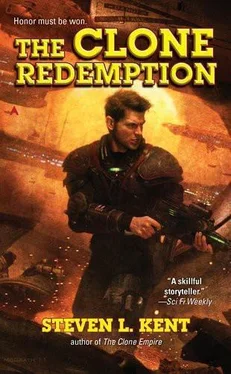Steven Kent - The Clone Redemption
Здесь есть возможность читать онлайн «Steven Kent - The Clone Redemption» весь текст электронной книги совершенно бесплатно (целиком полную версию без сокращений). В некоторых случаях можно слушать аудио, скачать через торрент в формате fb2 и присутствует краткое содержание. Жанр: Боевая фантастика, на английском языке. Описание произведения, (предисловие) а так же отзывы посетителей доступны на портале библиотеки ЛибКат.
- Название:The Clone Redemption
- Автор:
- Жанр:
- Год:неизвестен
- ISBN:нет данных
- Рейтинг книги:4 / 5. Голосов: 1
-
Избранное:Добавить в избранное
- Отзывы:
-
Ваша оценка:
- 80
- 1
- 2
- 3
- 4
- 5
The Clone Redemption: краткое содержание, описание и аннотация
Предлагаем к чтению аннотацию, описание, краткое содержание или предисловие (зависит от того, что написал сам автор книги «The Clone Redemption»). Если вы не нашли необходимую информацию о книге — напишите в комментариях, мы постараемся отыскать её.
The Clone Redemption — читать онлайн бесплатно полную книгу (весь текст) целиком
Ниже представлен текст книги, разбитый по страницам. Система сохранения места последней прочитанной страницы, позволяет с удобством читать онлайн бесплатно книгу «The Clone Redemption», без необходимости каждый раз заново искать на чём Вы остановились. Поставьте закладку, и сможете в любой момент перейти на страницу, на которой закончили чтение.
Интервал:
Закладка:
Until he mentioned the missile, I had not understood. “Can you tell how many transports we’ve lost?” I asked. We were at the front of the wave. I had no idea what had happened behind us.
“Seventy-five so far,” he said. “The fighters are taking it worse than us. They’re down a few hundred.”
I barely heard what Nobles said about the fighters because I was already trying to raise Freeman on the interLink.
“Ray. Ray, are you there?” If we lost Freeman, the mission was over.
“Here,” he said.
“We’re losing transports,” I said.
Just ahead of us, three fighters formed a small wing to clear our path. They stayed in a tight formation for a minute or two, firing lasers and particle beams into the glowing atmosphere ahead of us.
A missile hit the fighter on the right. It happened so fast I did not see where it hit or if the bird survived. One moment there were three ships, then the tinting over in our windshield darkened. When the tint cleared, there were two fighters instead of three.
“Just making sure you’re okay,” I said.
Freeman didn’t answer.
“Better brace yourself,” Nobles said. “We’re coming in hard.”
Before I could react, we slammed into the edge of Earth’s atmosphere and glanced off, only to strike it again and break through. The impact of the entry slung me back in my seat, my arms flying to the sides, my head snapped back. The force of the drop held me pinned in my chair. I struggled to sit up, to breathe, to see through the windshield.
Our fighter escort did not lead us down to the planet. We dived through bright mist and empty sky with no ships leading our way. The sky around us was crisscrossed with slowly evaporating vapor trails.
The Unifieds would not fire their nuclear-tipped missiles at us now that we had entered the atmosphere, the radiation would have come back to fry them. As we flew through the paper white sky, thick beams of silver-red light slashed the air around us.
“Lasers,” Nobles mumbled. He said it dismissively. We could survive a direct hit from a laser. He studied his scopes for a moment, and said, “Whatever is left of us has already entered the atmosphere. The fighters are headed back to the fleet.”
“How many transports do we have?” I asked.
Nobles hesitated, swallowed, said, “Two hundred sixty-five.”
“What the speck do we do now?” I asked. That left us with twenty-six thousand men plus change. We weren’t going to conquer Washington with twenty-six thousand men.
“We’d better land. Sooner or later, those lasers are going to wear down our shields,” Nobles said. Either a particle beam or possibly a short-range missile hit us. I thought it might have been a particle beam by the way we dropped. A hundred feet …a thousand feet …One moment we were flying straight ahead and the next falling straight down.
We had reached the eastern seaboard of the territory once called the United States. This was the seat of power, the capital of the Unified Authority. The ground below us was trussed with roads and highways. We skirted cities and traversed forests as we traveled up the coast at three times the speed of sound.
It was a clear day. We might have been ten miles out of Washington, D.C., the city skyline rose out of the tree-covered landscape up ahead. Until that moment, the Unifieds had only fired ground weapons at us, and I finally understood why. They were herding us, guiding us toward the capital itself and Joint Base Anacostia-Bolling, the largest military air base on Earth.
I shouted, “Put us down.”
“We’re in the middle of nowhere,” Nobles said. Then he saw fighters on his radar and the flashing amber warning light.
Nobles was a good pilot and a smart man. He knew we had a better chance of surviving a crash landing than an aerial assault. We had powerful shields but no weapons and limited maneuverability.
Nobles set off Klaxons to alert the Marines in the kettle about the upcoming crash. He hit the radio, and shouted, “Incoming fighters! Drop where you are! Drop where you are!”
We nose-dived toward the forest. Our shields obliterated the bare branches of trees that had shed their leaves for the winter. We skipped across the tops of the trees as Nobles cut our speed from thousands of miles per hour to hundreds. He righted our attitude, and our momentum hurled us forward. As I watched Nobles steering us into trees, I realized he was using them to slow us.
The shields held. Nothing hit the ship itself, but we spun and bumped and tilted and bounced, working our way down the last thirty feet. And then we touched down as delicately as a ballerina completing a grand jeté, and the world around us was silent.
CHAPTER FIFTY-FOUR
Back on Terraneau, Lieutenant Mars and his engineers tested the batteries in the Unified Authority’s new shielded armor and discovered that the batteries stored enough energy to power the armor for forty-five minutes. Their power usage spiked whenever anything hit the shields. If we hit them with a continuous laser stream or enough bullets, we could cut that battery life to a few minutes.
The only weapons their Marines could use while wearing the armor were the built-in fléchette guns that ran along the outsides of their sleeves—decidedly short-range weapons, accurate to one hundred yards.
The original plan was to cut off any outside support by surrounding Washington, D.C., then tightening the noose around the city’s neck as our reinforcements arrived.
They, of course, would retaliate by sending out soldiers in shielded armor; but we had that all figured out. With our M27s, we could hit the defenders from outside their range. We would drain their shields; and, once we depleted the batteries in their shields, we would annihilate them.
It was a good plan, and it probably would have worked had I had three hundred thousand troops. Instead, I had twenty-six thousand men, and we were cut off. We’d lost 90 percent of our birds on the way down, and there would be no reinforcements as long as the missile defenses remained operational.
Both Freeman and I survived. Most of the transports in the front of the pack made it through. That was because the fighters that cleared our way took the brunt of the attack. As long as Freeman was alive, there was still hope we might shut down the missiles.
“Everyone out! Regroup. Regroup!” I shouted over the interLink. I used a frequency for company commanders. The Unifieds would come looking for us shortly, and they’d have artillery. They would not have any trouble locating our transports; we’d practically crushed the forest when we crashlanded. As we did not have enough men to guard them, we’d need to leave the transports behind.
Our only hope was to hide in the forest, where we might be able to escape the Unifieds’ fighters. It wasn’t much of a hope. Once the fighters failed, the Unifieds would send slow-moving, low-flying helicopter gunships to flush us out. First they’d send gunships, then they’d send in tanks and Marines. We needed to move.
“Freeman, where are you?” I asked on a direct Link.
“I’m on my way,” he said.
“Do you want me to send a team with you?” I asked.
He didn’t answer. It was a stupid question. Sometimes a lone man can accomplish feats that an army could not. Working by himself, Freeman could hijack a car and infiltrate Washington unseen. Every person he added to his entourage made him that much more visible; and in this game, visibility was death.
“Is there any chance the Unifieds found your buildings?” I asked. Maybe I was losing faith.
Читать дальшеИнтервал:
Закладка:
Похожие книги на «The Clone Redemption»
Представляем Вашему вниманию похожие книги на «The Clone Redemption» списком для выбора. Мы отобрали схожую по названию и смыслу литературу в надежде предоставить читателям больше вариантов отыскать новые, интересные, ещё непрочитанные произведения.
Обсуждение, отзывы о книге «The Clone Redemption» и просто собственные мнения читателей. Оставьте ваши комментарии, напишите, что Вы думаете о произведении, его смысле или главных героях. Укажите что конкретно понравилось, а что нет, и почему Вы так считаете.












